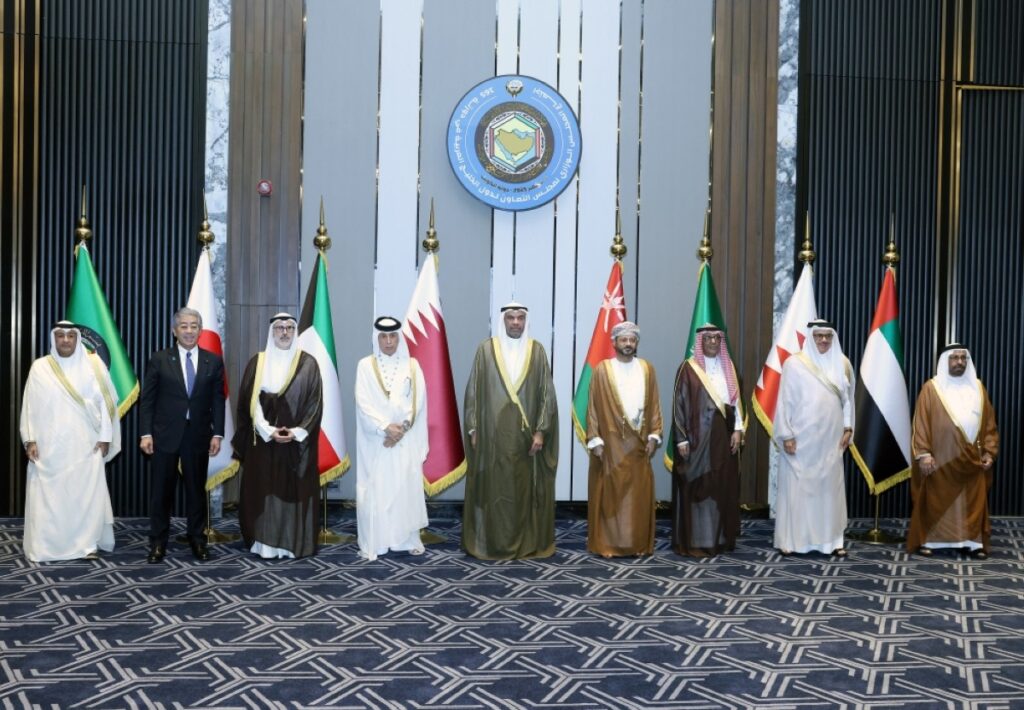GCC-Japan Ministerial Meeting, a platform to strengthen political and economic ties
By Khaled Al-Abdulhadi and Agencies
KUWAIT: Foreign Minister Abdullah Al-Yahya affirmed on Monday that the 165th regular session of the GCC Ministerial Council, along with the second GCC-Japan Strategic Dialogue, marked an important milestone in advancing joint Gulf action and addressing pressing regional and international developments. Al-Yahya highlighted the constructive role of Japanese Foreign Minister Takeshi Iwaya during the talks, describing it as a reflection of the “deep understanding” between the two sides in serving their shared interests. He further praised the valuable contributions of Gulf delegations, noting that their interventions “embodied Gulf unity” and contributed to positive outcomes that would strengthen cooperation across political, security, economic and humanitarian fields.
For his part, GCC Secretary-General Jasem Mohammed Al-Budaiwi said the 165th session provided an opportunity to exchange views on joint Gulf action while also convening a joint ministerial dialogue with Japan. He explained that the planned GCC-Ukraine ministerial meeting was postponed as the Ukrainian foreign minister was unable to travel from Kyiv. Al-Budaiwi expressed gratitude to His Highness the Amir Sheikh Meshal Al-Ahmad Al-Jaber Al-Sabah for Kuwait’s leadership of the current GCC session and to Minister Al-Yahya for hosting and organizing the ministerial meetings. He added that the coming months would see 14 ministerial committee meetings, reflecting the intensity of Gulf coordination.
He stressed that discussions covered a wide range of topics, including relations with international partners and the ongoing free trade negotiations with Japan. “We are very proud of the achievements realized during the past period, which have strengthened the Gulf journey and had a positive impact on both states and citizens,” he said.

KUWAIT: Japanese foreign minister Takeshi Iwaya (right) looks on during the GCC foreign ministers meeting in Kuwait on September 1, 2025.- Photos by Yasser Al-Zayyat

On Gaza, Al-Budaiwi condemned “serious and brutal violations” committed by Zionist forces against Palestinians, describing them as a flagrant breach of international law that threatens global security. He voiced concern over the international community’s inability to halt such practices, urging Japan to join the international coalition recognizing the State of Palestine. He said the Japanese side responded positively and promised to study the matter. Al-Budaiwi underlined that the meetings reaffirmed the historic Gulf-Japan partnership, culminating in agreement on the Joint Action Plan (2024–2028) covering cooperation in energy, trade, investment, academia and culture, in addition to expediting a GCC-Japan free trade agreement.
Japanese Foreign Minister Iwaya affirmed Tokyo’s pride in its strategic partnership with the GCC, emphasizing the need to strengthen cooperation in humanitarian, developmental, political and security domains. He described the Gulf states as “key partners for Japan in energy security,” noting that they supply more than 90 percent of Japan’s crude oil needs, while stressing Tokyo’s commitment to cooperation on clean energy, including hydrogen and ammonia.
Iwaya said the dialogue also covers advanced technology, education, culture and agriculture, aligning with global sustainable development goals. He praised GCC participation in 2025 Osaka Expo, saying international exhibitions deepen cultural exchange and open new avenues of cooperation. In its closing statement, the GCC Ministerial Council welcomed the UN General Assembly’s adoption of a resolution on UN-GCC cooperation, underscoring the bloc’s role as a regional partner in promoting peace and security.
The Council reaffirmed its firm positions on regional issues, particularly the Palestinian cause, calling for an immediate ceasefire in Gaza, protection of civilians, unimpeded humanitarian aid and the establishment of an independent Palestinian state on 1967 borders with East Jerusalem as its capital. It condemned Zionist policy of collective punishment, forced displacement, destruction of infrastructure and expansion of illegal settlements.
The Council also reiterated its positions on other regional files, including: Kuwait-Iraq maritime border demarcation beyond Marker 162, affirming Kuwait’s sovereignty; Joint Kuwaiti-Saudi ownership of the Dorra gas field, rejecting claims by any other party; UAE sovereignty over the three occupied islands (Greater Tunb, Lesser Tunb, and Abu Musa); Preserving maritime security in the Red Sea amid Houthi attacks on commercial vessels; Syria’s sovereignty and the need for accountability for violations, while condemning repeated Zionist airstrikes; Lebanon’s stability, the implementation of UNSC Resolution 1701, and continued support for UNIFIL; Yemen’s humanitarian crisis and preparations for the International Conference on Food Security in October; Pursuing dialogue on Iran’s nuclear program, with GCC participation in all related negotiations.
The Ministerial Council also condemned terrorism and extremism in all forms, including recent attacks in the Central African Republic and Pakistan, affirming solidarity with the victims and the UN.

